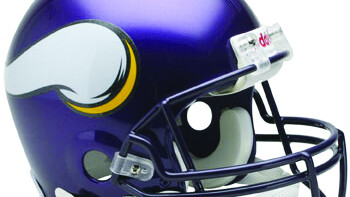The Other Side
taking a look from the perspective of a purple and gold fan
 Volume One columnist Luc Anthony is a Vikings fan. Yeah, one of those. But what better way to keep a friendly rivalry alive than to get a glimpse at the other face of the coin? We asked a true-life Vikings fan a couple of questions about the Packers, Minnesota, and loveable losers:
Volume One columnist Luc Anthony is a Vikings fan. Yeah, one of those. But what better way to keep a friendly rivalry alive than to get a glimpse at the other face of the coin? We asked a true-life Vikings fan a couple of questions about the Packers, Minnesota, and loveable losers:
What do you admire most about the Packers?
If a Viking fan admitted the truth, they would have a long list of aspects they admire about the Packers. Heck, I have always said that if I were being introduced to football, the Packers would be my choice for a favorite team based on what I regard highly in sports franchises. What do I admire the most? I have a tie: the team being owned by fans instead of a rich owner, and the team playing in a classic and relatively old stadium with benches for seats. I envy the Packers.
What made you ‘hate’ the Packers?
The lack of respect from Packer fans for the Vikings while growing up in this state. It’s not intense, but nothing the team accomplishes seems worthy of praise. No, they haven’t won a Super Bowl – so everyone can skip reminding me of that AGAIN – but they have been one of the better NFL teams of the last half-century. They had tough, respectable teams by any objective measure for many years. Yet, most times I see and hear juvenile jabs – albeit not intensely, since we all have that “Upper Midwestern nice.” Packers fans can be like the snobbish older brother who succeeds at everything and keeps you in your place. (A remarkably similar situation: the Yankees-Red Sox rivalry pre-2004.) If not for the fantasy football boom, I bet Adrian Peterson wouldn’t get nearly the praise he receives in this area.
How do the Vikings weave themselves into the culture of Minnesota?
Being named after a historical figure with the same heritage as many of Minnesota’s Norwegian-American residents sure helped. Playing blue collar football in the coldest, snowiest weather in the country (yes, the Twin Cities are colder in winter than the frozen tundra in Green Bay) endeared the Vikes to the wintry sensibilities of Minnesotans. Actually, being a choke-worthy dome team with off-field scandals in the last three decades has done a lot to wear away that connection; if not for the mega-popularity of the NFL, the Vikings might have the same cachet as the Timberwolves.
Be honest: What team has a better aesthetic?
The Packers. Traditional striping patterns on the jerseys and pants, block numbers, a garish color scheme the team does not shy away from (green and what’s really canary yellow) – they’ve had almost the same design since JFK was President. They have a “look.” If the Vikings had stayed with their ’70s set, I’d favor them, but alas, they evolved ... and mostly, for the worse. Their new uniform set this year has corrected the hideous error of the past seven seasons, but the Pack still wins ... except for helmet logo. The “G” is iconic, but the swooping Viking horn is almost the best in the league.
What brings the community together more: The loveable loser mentality (Vikings in more recent years) or the championship mentality (Vikings in the ’90s)?
People like a winner, and people like confidence, so the championship mentality always leads to a better community attitude and demeanor, if not some arrogance. Loveable losers really only work when a team has some overriding feature that seemingly makes championships less important than usual (i.e., Wrigley Field for the Cubs ... and, to some degree, Lambeau and the people-owned small market team image in the Packers’ case). However, even each team’s fan base reacts differently to winning and losing times: in down years for the Pack, the fans reflect on the several championship eras and, despite griping about the defense or Ted Thompson, only need to hear “Lombardi” and then grin. Down years for the Vikings lead to community apathy and the threat of TV blackouts from shaky ticket sales; in good years, Vikings fans expect something tragic or – at best – a disappointing ending to the season, which summarily comes to fruition.




















